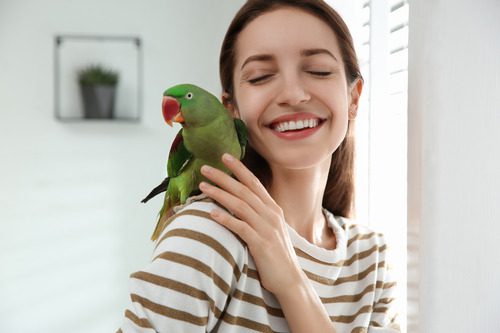Why Does My Pet Bird Bite Me?
When you bring a pet bird into your home, you look forward to the joy and companionship it can offer. However, an unexpected behavior like biting can turn your delightful bird-watching sessions into moments of frustration and confusion. This blog will highlight the reasons behind why your pet bird might bite you and offer insights on how to handle this behavior. Remember, if you’re concerned about your bird’s behavior or health, the team at Paws and Claws Animal Medical Center in Dunedin, FL is here to help. Call us at (727) 953-6588 for more advice.

Understanding Bird Behavior: Why Do Birds Bite?
Birds are not naturally aggressive creatures, but they might exhibit biting behavior for several reasons. Understanding the underlying causes can help you address the behavior more effectively.
Fear and Protection
Birds often bite when they feel threatened or need to defend themselves. If something in their environment makes them nervous—whether it’s a loud noise, a sudden movement, or an unfamiliar person—biting is a reflexive action for protection.
Communication
Sometimes, a bite is not an act of aggression but a way to communicate. Birds might nip to tell you that they are uncomfortable with how they are being handled or if they want to be left alone. Paying attention to the signs preceding a bite can help you better understand what your bird is trying to tell you.
Hormonal Changes
During breeding seasons, birds can become more territorial and aggressive. Hormonal surges can lead to behaviors like biting as your pet tries to express its instincts.
Health-Related Issues
In some cases, biting may be linked to health issues. If your bird is in pain or discomfort, it might bite to express its distress. Ensure your bird has regular check-ups with a veterinarian to rule out any medical issues that could cause discomfort or pain, leading to biting behavior.
Strategies to Reduce Biting
Knowing why your bird bites is the first step toward mitigating this behavior. Here are some strategies to help reduce or eliminate biting from your feathered friend’s repertoire.
Training and Socialization
Proper training can go a long way in reducing biting incidents. Teach your bird commands like “step up” on your hand without biting. Socialization also plays a critical role. The more comfortable your bird is with its surroundings and the people around it, the less likely it is to feel threatened and resort to biting.
Environmental Enrichment
Boredom and lack of stimulation can also lead to biting. Make sure your bird has plenty of toys and activities to engage with. Regular interaction with humans and other birds can also keep its environment stimulating and enriching.
Recognize the Warning Signs
Before a bird bites, it often shows signs of distress or agitation, such as feather ruffling, squawking, or retreating. Recognizing these signs can help you adjust your behavior and prevent a bite.
When to Seek Professional Help
If your bird’s biting behavior persists or worsens, it may be time to consult with a professional. Behavioral specialists or avian veterinarians can offer more personalized strategies based on the specific needs of your pet. If you notice any sudden changes in behavior, contact Paws and Claws Animal Medical Center at (727) 953-6588.
Discerning Your Pet Bird’s Behavior
While it can be challenging to deal with, remember that biting is often a bird’s way of communicating discomfort or fear. With patience and the right strategies, you can help create a more trusting and positive relationship with your bird. If you need further assistance, do not hesitate to call Paws and Claws Animal Medical Center in Dunedin, FL, at (727) 953-6588. Our expert team is here to support you and your bird every step of the way.
